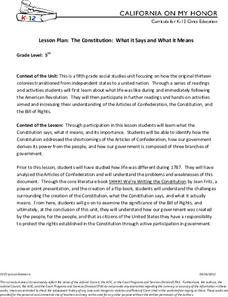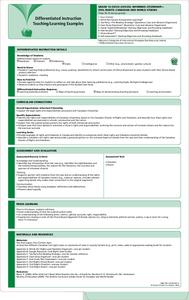State Bar of Texas
Marbury v. Madison
Who has the final say in matters dealing with the rules under the United States Constitution? The case Marbury v. Madison brings to light the issue of judicial review. Learners investigate the Supreme Court's opinion in the case with a...
School Improvement in Maryland
Analysis of Marbury v. Madison
Should the United States Supreme Court have the power of judicial review? Instructors guide class members through a review of Marbury v. Madison and assist class members in writing a brief of the case. As independent practice,...
Judicial Learning Center
The Judge and the Jury: Trial by Jury
Why is it so important to have a trial by jury in the American judicial system? This right is one of the hallmarks of American democracy, but it also comes with the responsibility of serving on a jury if called. Young legal scholars...
American Bar Association
What Is Separation of Powers?
Who has the power? Scholars investigate the creation of the three branches of government in the United States Constitution. They analyze just why the framers created the branches the way they did.
State Bar of Texas
Baker v. Carr
Can the federal government override the state government to protect the citizens of the United States? The 1962 Supreme Court case Baker v. Carr outlines the issue of equal protection under the law. Scholars investigate with a short...
School Improvement in Maryland
Dividing the Powers of Government
Who does what? To develop an understanding of the balance of power between the US federal and state governments, class members research responsibilities in terms of legal systems, security issues, economic activities, lawmaking, and...
School Improvement in Maryland
Building a Pyramid
After reviewing the structure and powers of the three branches of the US government, groups investigate a problem and research what is being done to address this criticism.
Judicial Learning Center
Your 1st Amendment Rights
Why should classes care about the First Amendment? An engaging lesson serves as a powerful tool for answering just that. As all four cases in the lesson relate directly to freedom of expression in schools, young scholars explore the...
Judicial Learning Center
Your 4th Amendment Rights
Americans love to learn about their rights, especially those that protect them from the government's power to invade their privacy. Young people are especially engaged by this topic. An informative lesson explores four Supreme Court...
Judicial Learning Center
Getting Ready for Trial
A courtroom can be a scary place for the uninitiated. Get familiar with the process using a helpful overview of the activities that take place prior to both civil and criminal cases. The lesson explains the differences between...
C-SPAN
Middle School Checks and Balances
Seven video clips reveal how the checks and balances built into the constitutional framework of the United states' government are designed to keep any one branch from becoming too powerful. After watching each clip, groups identify the...
C-SPAN
14th Amendment Equal Protection Clause
Two Supreme Court cases, Plessy v. Ferguson and Brown v. Board of Education take center stage in a lesson about the Equal Protection Clause of the 14th Amendment. Class members research both cases to compare and contrast the rulings.
Advocates for Human Rights
Mock Immigration Court
As part of a unit study of immigration, class members participate in a mock Immigration Court activity in which they argue four cases before an immigration judge.
Judicial Branch of California
The Constitution: What It Says and What It Means
Learners get the chance to act as representatives to the Constitution Convention, and must decide whether or not to recommend your state ratify the new framework. After examining the Constitution line-by-line, they consider their...
University of North Carolina
Plagiarism
As many unfortunate journalists have learned, taking someone else's ideas and passing them off as your own is never a good idea. It's called plagiarism—and it's a big deal. Thankfully, a handout helps writers learn how to avoid...
Judicial Branch of California
Defining Civic Duty and Participation
A lesson, geared toward older elementary scholars, combines art with social studies to explain the purpose of civic duty and how to encourage others in the community to participate. Academics create advertising campaigns to promote civic...
Ontario
Informed Citizenship—Civil Rights
To launch a study of civil rights, class members brainstorm rules and expectations of behaviors at home, in school, in the workplace, and in sports. They then look at civil rights cases and examine the rules embedded in these cases.
Curated OER
Woodrow The White House Mouse
Inauguration Day is January 20. Implement an entire week's worth of mini activities to help young historians become knowledgeable of the President's job, the executive branch, and the White House. The worksheets focus on...
USA.gov
How The Supreme Court Works
Just how does a case come before the highest court in the land? A graphic flow chart unpacks how plaintiffs come before the Supreme Court. Graphics include background on the nine justices and just how many cases they actually hear each...
Curated OER
MLK Letter From Birmingham Jail Analysis
Designed as a PowerPoint presentation for AP English class, this resource provides a detailed analysis of the content, format, and purpose of Dr. Martin Luther King, Jr’s “Letter from the Birmingham Jail.” Because much of the...
Curated OER
How was the Constitution Used to Organize the New Government?
How did the United States Congress determine how the new president and vice president would be named when the nation was first established? Who would provide money for the government, and how would the executive branch be organized?




















